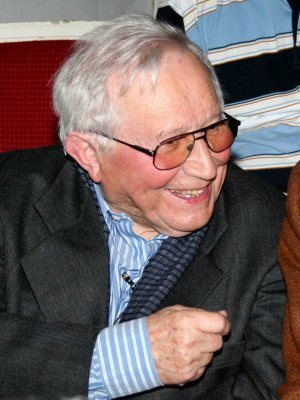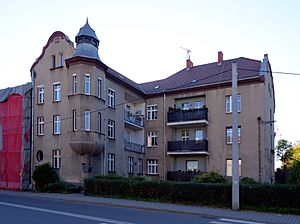Tadeusz Różewicz facts for kids
Quick facts for kids
Tadeusz Różewicz
|
|
|---|---|

Tadeusz Różewicz in 2006
|
|
| Born | 9 October 1921 Radomsko, Poland |
| Died | 24 April 2014 (aged 92) Wrocław, Poland |
| Occupation | Writer |
| Language | Polish |
| Education | Jagiellonian University |
| Notable works | The Card Index Mother Departs The White Wedding |
| Notable awards | Austrian State Prize for European Literature (1982) Struga Poetry Evenings Golden Wreath (1987) Nike Award (2000) European Prize for Literature (2007) |
Tadeusz Różewicz (born October 9, 1921 – died April 24, 2014) was a famous Polish writer. He was a poet, wrote plays, and translated books. Tadeusz was one of the first Polish writers born after Poland became an independent country again in 1918. Before that, Poland had been divided by other countries for about 100 years.
He was born in Radomsko, a town near Łódź, in 1921. He started publishing his poems in 1938. During World War II, he joined the Home Army, which was a secret Polish group fighting against the invaders. His older brother, Janusz, who was also a poet, was killed in 1944 because he was part of the Polish resistance. His younger brother, Stanisław, became a well-known film director.
Life and Writing Career
Tadeusz Różewicz's parents were Władysław and Stefania Różewicz. After finishing high school, Tadeusz went to Jagiellonian University in Kraków. He then fought in World War II. After the war, he moved to Gliwice and lived there for two years. In 1968, he moved to Wrocław, where he stayed for the rest of his life.
Between 1944 and 1960, Różewicz wrote and published fifteen books of poetry. Another famous Polish writer, Czesław Miłosz, even wrote a poem about Różewicz in 1948. Tadeusz Różewicz started writing plays in 1960. His first play was called The Card Index (Kartoteka).
He wrote more than ten plays and several movie scripts. While writing plays, he also kept writing poetry and other stories. Some of his most famous plays, besides The Card Index, include The Interrupted Act (1970) and The White Wedding (1975). His collection called New Poems was even nominated for a big award in 2008.
Różewicz's books have been translated into almost all major languages around the world. Two of his plays were translated into English. They were performed at a theater in New York City called La MaMa Experimental Theatre Club in the 1960s and 1970s.
Many people saw Różewicz as a very creative writer. He was known for continuing the "avant-garde" style in Polish and international writing. Avant-garde means new and experimental. He was a member of the Polish Writers' Union. He was also nominated many times for the Nobel Prize in Literature, which is a very important award. In 1987, he won the Golden Wreath award at a poetry festival in Struga, Macedonia. In 2000, Różewicz won Poland's top literary prize, the Nike Award, for his book Matka odchodzi (Mother Is Leaving).
Tadeusz Różewicz passed away in Wrocław on April 24, 2014. He was 92 years old.
Awards and Honors
Tadeusz Różewicz received many awards and honors throughout his life for his amazing writing:
- 1948 – Army Medal for War 1939-45
- 1955 – Gold Cross of Merit
- 1955 – State Prize, 2nd class
- 1966 – State Prize, 1st class
- 1974 – Home Army Cross
- 1974 – Polish Army Medal
- 1977 – Order of the Banner of Work, 2nd class; for all his literary work
- 1981 – Operation Tempest medal
- 1982 – Austrian State Prize for European Literature
- 1987 – Struga Poetry Evenings Golden Wreath
- 1991 – Honorary degree from the University of Wroclaw
- 1996 – Grand Cross of the Order of Polonia Restituta
- 1997 – Golden Ball award
- 1997 – Polish PEN Club award (Jan Parandowski)
- 1999 – Honorary degree from the University of Silesia
- 2000 – Order Ecce Homo: A Polish church award for his deep writing about human nature.
- 2000 – Honorary doctorate from the University of Opole
- 2000 – Honorary degree from the Jagiellonian University
- 2000 – Nike Award (Polish literary award)
- 2001 – Honorary degree from the University of Warsaw
- 2006 – Honorary doctorate from the University of Gdansk
- 2006 – Golden Sceptre award
- 2007 – Honorary degree from the Academy of Fine Arts in Wroclaw
- 2007 – European Prize for Literature
- 2008 – Laurel Award in poetry
- 2009 – Medal for Merit to Culture – Gloria Artis
- 2009 – Honorary degree from the Jan Kochanowski University in Kielce
- 2011 – Policy Wizard special Culture 2010 award – for staying true to his poetry and asking important questions in Polish literature.
- 2012 – Griffin Poetry Prize international shortlist for Sobbing Superpower: Selected Poems of Tadeusz Różewicz (translated by Joanna Trzeciak)
In Pop Culture
Tadeusz Różewicz's work has even appeared in music and movies!
- A Slovenian punk band called Niet used parts of his poem Pierwsza miłość (First Love) in their 1984 song Lep dan za smrt (A Nice Day for Death).
- The filmmaker Werner Herzog used a line from Różewicz's "Draft of a Modern Love Poem" in his 2007 movie Encounters at the End of the World. He said, "For me, the best description of hunger is a description of bread. A poet said that once, I think."
- In 2008, another Slovenian band, Dan D, remade Niet's song. It became one of the top songs on Slovenian radio that year.Template:KIDDLE XL START
See also
 In Spanish: Tadeusz Różewicz para niños Template:KIDDLE XL END
In Spanish: Tadeusz Różewicz para niños Template:KIDDLE XL END


